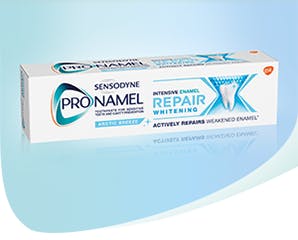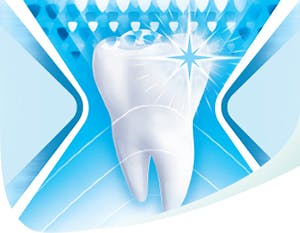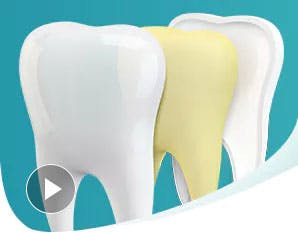
How to Repair Tooth Enamel and Prevent Acid Erosion
Enamel is the hard outer surface of your tooth that protects the dentin and other inner layers underneath.1 Because tooth enamel contains no living cells, once it’s gone, your body can’t repair damage from enamel wear on its own.1 The good news is that it’s possible to repair enamel and prevent dental erosion with a good oral care routine and diet.2
Learn more about how you can help strengthen your enamel to prevent erosion below.
What Causes Teeth to Lose Enamel?
Enamel can need repairing for a variety of reasons, but one cause of tooth enamel loss is acid erosion caused by certain acidic foods and drinks.2 These acids attack your tooth enamel, wearing away the minerals that keep it strong, which is why you should protect your enamel.2
Typical signs of tooth enamel loss are:2
- Discolored, yellowing teeth
- Hollows in your teeth and wearing away of the tooth surface and biting edges
- Tooth pain or sensitivity
Acid erosion can weaken tooth enamel over time but, thankfully, it is possible to encourage weakened tooth enamel to strengthen and actively repair itself in a process called remineralization.3
How Does Tooth Remineralization Work?
Think of your mouth as a battleground between the ‘bad guys’ – the acids that remove minerals from tooth enamel in a process called demineralization – and the ‘good guys’ – saliva, your body’s natural defense against acid erosion. Saliva, which contains minerals such as calcium and phosphate, helps to repair enamel and reverse microscopic acid damage in a process called ‘remineralization’.4
Learn more about how remineralization can reharden and strengthen enamel.
How to Repair Tooth Enamel and Prevent Tooth Enamel Erosion
Tooth Enamel Repair – Fact vs Fiction:
- FACT: Drink more water. Drinking water with fluoride helps prevent tooth decay.4
- FACT: Chew sugar-free gum after eating. Chewing gum is a great tool to help weakened tooth enamel repair because it boosts that all-important saliva production.4 Be sure to look for sugar-free gums with the ADA Seal of Acceptance.
- FACT: Consume soda and soft drinks in moderation. These beverages are highly acidic and can wear away enamel.4
- FICTION: Brush your teeth immediately after eating. Wait one hour after having any acidic foods or drinks before you brush. This will give your teeth time to build up their mineral content and repair your enamel.2 Ideally, use an enamel-strengthening toothpaste such as Pronamel Intensive Enamel Repair Extra Fresh. Pair your Pronamel toothpaste with our Intensive Enamel Repair Mouthwash for that actively repairs acid-weakened enamel beyond brushing alone.
- FACT: Dairy and fiber-rich fruits and vegetables are good for teeth. Fiber-rich foods don’t just help to keep your teeth and gums clean, they also help to increase essential saliva flow.4 The calcium and phosphates in dairy products like milk, cheese and yogurt can help to remineralize and rebuild your acid-weakened enamel.4
- FACT: Use a soft toothbrush when brushing your teeth. Use a soft-bristled toothbrush and brush gently twice a day for at least two minutes.2
- FACT: Pronamel toothpaste protects against the effects of enamel erosion and helps to strengthen acid-weakened tooth enamel.* Pronamel helps rebuild enamel strength. Pronamel is the number one dentist-recommended brand for strengthening and protecting enamel.
Make sure you go for regular dental checkups to keep your tooth enamel healthy and your smile bright. Find out where to buy Pronamel toothpaste to help keep your teeth healthy. In addition, strengthen your acid-weakened enamel beyond brushing alone with Pronamel’s Intensive Enamel Repair Mouthwash.**
*With twice-daily brushing.
** When used as directed with a fluoride toothpaste
Source Citations:
- Tooth. Mouth Healthy. https://www.mouthhealthy.org/en/az-topics/t/tooth. Accessed 21/01/20.
- Dental erosion. Oral Health Foundation. https://www.dentalhealth.org/dental-erosion. Accessed 21/01/20.
- Demineralization–remineralization dynamics in teeth and bone. International Journal of Nanomedicine, 2016. https://www.ncbi.nlm.nih.gov/pmc/articles/PMC5034904/pdf/ijn-11-4743.pdf. Accessed 30/03/20.
- The Best and Worst Foods for your Teeth. University of Rochester Medical School. https://www.urmc.rochester.edu/encyclopedia/content.aspx?ContentTypeID=1&ContentID=4062. Accessed 30/03/20.



